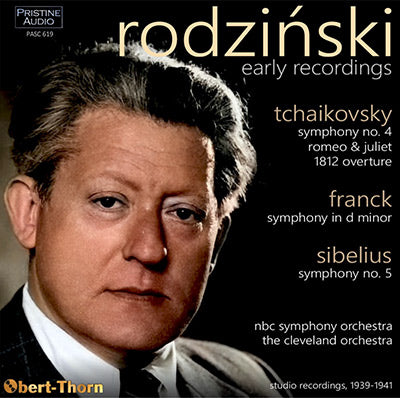
This album is included in the following sets:
This set contains the following albums:
- Producer's Note
- Full Track Listing
- Cover Art
Born in Split, Dalmatia in 1892, Artur Rodziński was raised in Poland and studied music there and in Vienna, where his teachers included Franz Schalk. After a stint as chorus master in Lwów, Poland, he graduated to conducting opera in that city in 1920. Five years later, while leading a performance of Die Meistersinger in Warsaw, he was “discovered” by Leopold Stokowski, who brought him to Philadelphia as his assistant.
In 1929, Rodziński became music director of the Los Angeles Philharmonic, where he stayed for four seasons. He went on to head the Cleveland Orchestra for a decade beginning in 1933. Conducting at the Salzburg Festival in 1936, Rodziński so impressed Toscanini that the Maestro requested that he be engaged to train the members of the orchestra that was being created for him, the NBC Symphony. Rodziński led their first concert on 2 November 1937 as well as ten more before making the two recordings which begin our program.
The “World’s Greatest Music” label was begun by the New York Post to market recordings of standard Classical repertoire at prices which substantially undercut the majors. Neither the conductors nor the orchestras were named on the labels; but subsequent research has identified albums recorded by Eugene Ormandy and the Philadelphia Orchestra and Fritz Reiner and the New York Philharmonic, among others. The recordings were made by RCA Victor and were pressed by them as well, using cheaper and noisier shellac than their Red Seal releases.
Although Rodziński had conducted on some operatic aria recordings in Poland (as well as being Stokowski’s piano accompanist on two of his album “talk sides”), these 1939 NBC Symphony discs were his first as a symphonic conductor. He had led neither work previously with the ensemble; and while the orchestra had played the Franck once under Monteux in their first season, they were new to the Tchaikovsky. Perhaps due to this, each side of the Franck was able to be done in a single take, while two takes were required for three of the Tchaikovsky sides. Rodziński turns in solid performances which generate particular excitement at the ends of the first and last movements of each work.
Simultaneously with his work at NBC, Rodziński continued to lead the Cleveland Orchestra; and by the end of the year in which he made the NBC discs, he and the Cleveland were under contract to the Columbia label, where they made an extensive series of recordings over the next three seasons. The three works on the second half of our program date from that period. They were recorded directly onto wide-frequency range lacquer discs, from which the 78s and, later, LPs were dubbed.
Although George Szell is usually credited for the developing the Cleveland Orchestra into a virtuoso ensemble, one can hear from these recordings that Rodziński had already honed it into a formidable instrument. In the Tchaikovsky works, Rodziński presses forward with a Toscanini-like focus; yet, when the music calls for it, he slows down to make rhetorical emphases like Stokowski or Mengelberg, but without employing string portamenti, which was already fading from fashion by this time. The Sibelius Fifth, like his later recording of the Fourth with the New York Philharmonic, blazes with intensity, and makes one regret that he recorded no more of that composer’s symphonies.
Rodziński would leave Cleveland for the New York Philharmonic in 1943, and subsequently move on to the Chicago Symphony in 1947 (Pristine PASC 569). After that last one-season appointment, he would no longer command an ensemble, and spent his remaining decade guest-conducting and recording primarily in Europe. He died in Boston in 1958, shortly after leading a triumphant production of Tristan at the Chicago Lyric Opera with Birgit Nilsson.
Mark Obert-Thorn
ARTUR RODZIŃSKI Early Recordings
CD 1 (79:44)
TCHAIKOVSKY Symphony No. 4 in F minor, Op. 36
1. 1st Mvt. – Andante sostenuto – Moderato con anima (16:08)
2. 2nd Mvt. – Andantino in modo di canzona (8:39)
3. 3rd Mvt. – Scherzo: Pizzicato ostinato (Allegro) (5:26)
4. 4th Mvt. – Finale (Allegro con fuoco) (9:19)
Recorded 2 January 1939 in Carnegie Hall, New York City ∙ Matrices: CS
030868-1, 030869-2, 030870-2, 030871-1, 030872-1, 030873-1, 030874-2,
030875-1, 030876-1 & 030877-1 ∙ First issued on World’s Greatest Music
SR-23/27
FRANCK Symphony in D minor
1. 1st Mvt. – Lento (18:25)
2. 2nd Mvt. – Allegretto (10:45)
3. 3rd Mvt. – Allegro non troppo (11:03)
Recorded 2 January 1939 in Carnegie Hall, New York City ∙ Matrices: CS
030878/89 (All Take 1) ∙ First issued on World’s Greatest Music SR-33/38
Artur Rodziński ∙ NBC Symphony Orchestra
CD 2 (60:49)
1. TCHAIKOVSKY Romeo and Juliet – Fantasy Overture (18:16)
Recorded 14 December 1940 in Severance Hall, Cleveland ∙ Matrices: XCO
29305/9 ∙ First issued on Columbia 11655/57-D in album M-478
2. TCHAIKOVSKY Ouverture solennelle “1812”, Op. 49 (14:23)
Recorded 14 April 1941 in Severance Hall, Cleveland ∙ Matrices: XCO
30559/62 ∙ First issued on Columbia 11630/31-D in album X-205
SIBELIUS Symphony No. 5 in E-flat, Op 82
3. 1st Mvt. – Tempo molto moderato – Largamento – Allegro moderato (12:03)
4. 2nd Mvt. – Andante mosso quasi allegretto (8:02)
5. 3rd. Mvt. – Allegro molto (8:05)
Recorded 28 December 1941 in Severance Hall, Cleveland ∙ Matrices: XCO
32233/37 & 32290/91 ∙ First issued on Columbia 11832/35-D in album
M-514
Artur Rodziński ∙ The Cleveland Orchestra
Producer and Audio Restoration Engineer: Mark Obert-Thorn
Special thanks to Nathan Brown and Charles Niss for providing source
material
Total duration: 2hr 20:33 CD1: 79:44 CD2: 60:49

